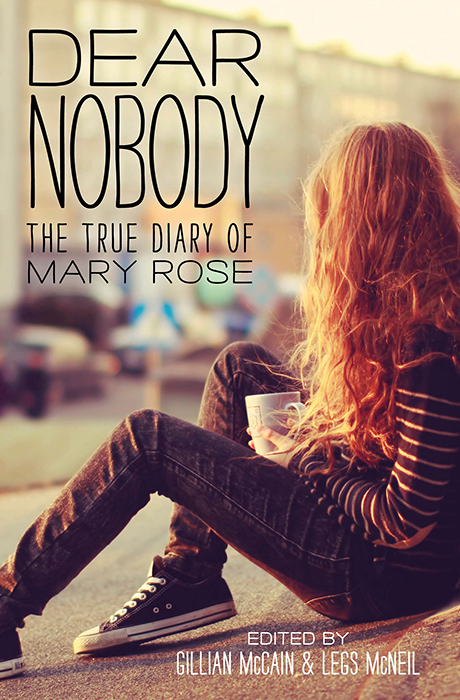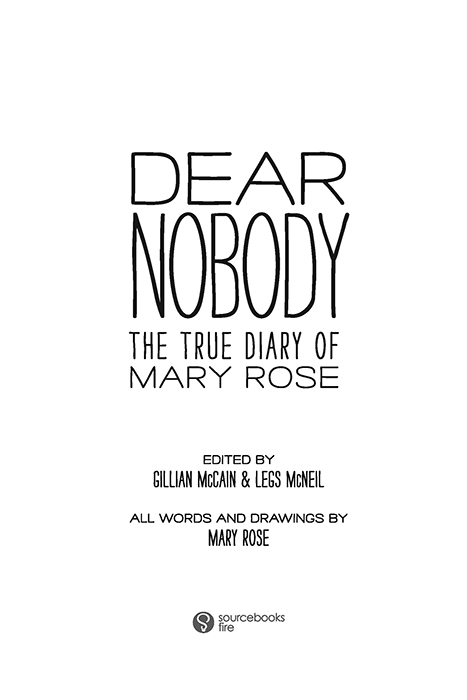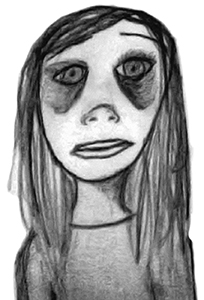Dear Nobody
Authors: Gillian McCain



Copyright © 2013 by Gillian McCain and Legs McNeil
Cover and internal design © 2013 by Sourcebooks, Inc.
Title branding by Christian Fuenfhausen
Internal design by Kristina Berg
Cover image © Iness Rychlik / Trevillion Images
Author Photo for Gillian McCain by Kate Simon
Author Photo for Legs McNeil by Tom Hearn
Sourcebooks and the colophon are registered trademarks of Sourcebooks, Inc.
All rights reserved. No part of this book may be reproduced in any form or by any electronic or mechanical means including information storage and retrieval systemsâexcept in the case of brief quotations embodied in critical articles or reviewsâwithout permission in writing from its publisher, Sourcebooks, Inc.
Published by Sourcebooks Fire, an imprint of Sourcebooks, Inc.
P.O. Box 4410, Naperville, Illinois 60567-4410
(630) 961-3900
Fax: (630) 961-2168
Library of Congress Cataloging-in-Publication data is on file with the publisher.
Phoenixville, PA: Winter, 1997
Phoenixville, PA: Spring, 1997
Phoenixville, PA: Early Summer, 1997
Wernersville, PA: Summer, 1997
Phoenixville, PA: Summer, 1997
Phoenixville, PA: Late Summer, 1997
Phoenixville, PA: Late Summer, 1997
Wernersville, PA: Late Summer, 1997
Phoenixville, PA: Winter, 1997â1998
Phoenixville, PA: Spring, 1998
Phoenixville, PA: Summer, 1998
Children's Clinic of Philadelphia: Winter, 1998â1999
Phoenixville, PA: Winter, 1999
What if “Don't worry, you'll grow out of it” doesn't apply to you? How would you choose to live your teenage life knowing that any day could be your last?
Mary Rose wrote these journals between the ages of fifteen and seventeen. In them, she pours her heart out about everything from falling in love to fighting addiction to figuring out how to make her mark on the world. Her writing is powerful and rawâsometimes brutal, sometimes funny, and more often than not, insightful.
Though the Internet existed in in the mid-nineties, it was not yet accessible to everyone. Most high school kids still wrote by longhand, passed notes on paper, and called their friends on a landline. Parents couldn't track you via social media. If you were walking alone, at night, in the rain, along a desolate highway, you probably didn't have a cell phone to call for a ride home.
But most importantly in this case, you didn't chronicle your life in 140 characters or less. You wrote about your life in notebooks, described it in long letters to friends that you stamped and mailed, and took photographs that you got developed at the drugstore. You could probably count the number of friends you had on two hands. There was still a thing called privacy, and it was still possible to keep secrets about yourself. Your thoughts had room to develop. You had time to contemplate. You could describe, at length, what the water felt like when you went skinny-dipping that night. And you didn't have to worry that naked pictures would pop up on the Facebook the next day.
And yet the experiences and struggles that Mary Rose had are no different from the ones teenagers face today: loneliness, insecurity, depression, physical, emotional and sexual abuse, drug and alcohol problems, bullying, break-ups, and divorce.
Every word of this remarkable tale is true, though all of the names, except for Mary Roses's, have been changed to protect her anonymity. A friend of hers shared these journals with us after being asked, “What's the best thing that you have read lately?” Once we had the opportunity to read them ourselves, we were completely captivated. Though this book represents only a sample of the 600 pages of her work, we didn't change a word.
Welcome to Mary Rose's extraordinary worldâwe hope that you find her story as unforgettable as we do.
Gillian McCain
LATE FALL, 1996

Dear Nobody,
Tonight I got arrested. I hate saying that, but it happens.
I had a 40 ounce beer in my hand and one in my book bag and I smelled like it. I was walking with my two friends, when this cop pulls up and goes, “Is something wrong?”
We all said nothing was wrong, but then the cop pointed to me and said, “Why does she look so sad?”
I made up some bullshit about how my boyfriend and I just broke up, but by then he had already seen the 40 ounce I was hiding in my coat.
They arrested me, but not my two friends, because they had no alcohol on them. My mom picked me up at the police stationâand on the way back home we got into a fight over the time when I was twelve and she had pot in her car. A lot, too.
So I just got out of the car and tried to walk my drunken ass home, but it turns out I was walking in the wrong direction. I could've walked from Reading to Pottstown; that's over twenty miles. Shit, I bet I would've kept walking, if I hadn't seen this mall I knew, and was like, “Oh shit, what now?” I turned around and went to a store I saw closing up. It was after ten. Actually, I had been making pretty good time. I'm glad that I'm in fairly good shape right now, because I would never have made it if I was sick.
So I had time to think things through.
When I got back to Reading, I let this cop car see me, because it was past curfew and I wanted a ride home. Also, I had a feeling I wouldn't get fined; I figured there was no way, after all this shitâthat anything else that fucked up could happen to me.
The cop came into my house and talked with my mom and me. He said he wanted me to grow up to be happy and healthy, and that he wanted me to introduce him to my kids some day, and that he wanted to see me live to grow old.
First off, I'll never have kids.
And secondly, I'll never get old.
It's hard to grow old when you're dead.
Dear Nobody,
Today my mother's boyfriend, Joe, started threatening my lifeâsaying he'd slit my throat and break my neckâand that it would be worth the jail time. When my mother tried to protect me, he swore she'd be dead in the river with me. She stopped protesting after thatâshe's a TERRIBLE swimmer.
Then Joe started in with even more violent threats; trying to break us down, the worst way he knew how, like calling me “a half-dead motherfucker!” When he started to get REALLY violent, my mother ran upstairs to get her pot out of the house so we could call the police. I told him that I wasn't scared of him and to “get out of our house
now!
” That made him even angrier, because his threats and bullying were futile against me. I guess he felt powerless. When he went to grab me, my mother jumped in between us and told him to get away from me. He grabbed her armâthe same arm I heard snap when my stepfather, Darrell, broke it in front of me when I was eight. Then Joe jerked her towards him. His breath was heaving and his eyes were wide with anger. My defenseless and pathetically weak mother had that familiar fear on her face and was meekly trying to fend him off. Nothing in me snappedânothing flashed before my eyes; I remained calm and neutral. SOMEONE had to.
I refuse to live amid anger or fear. I looked directly into his crazed eyes; stared point-blank into his rage, as I'm sure no other woman ever has, especially a teenager. I spoke calmly and said, “Get off of my mother! Nobody touches her like that! Nobody will hurt my mother, especially not you! You are woman-beating trashâgo back to jail!!!” (Joe did time for assault and kidnapping, among other things).
He was stunned for a minute, just like Darrell had been when I told him (practically) the same thing. But Joe's shock didn't last long. His flood of anger returned quickly enough for him to hurl my mother into a door that had a full-length mirror on it. She fell forward, holding her arm in pain. He was yelling even louder now but I still wasn't scaredâmy pulse didn't even raise enough for me to break into a sweat.
He started to holler,
“ALL RIGHT, YEAH, NOW THAT I'VE GOT ALL OF YOU BITCHES UP HERE WE'RE GOING TO SEE SOME SHIT FLY! THE NEIGHBORS CAN'T CALL THE COPS NOW, BECAUSE THEY CAN'T HEAR YOU MOTHERFUCKERS!!!”
He was pushing things out of the way to get to me. By that time, I was on the bed, climbing to the window and yelling for help at the top of my lungs,
“SOMEBODY CALL THE POLICE! HELP! HELP US! HELP MY MOM!”
He grabbed me and said, “What the fuck do you think you're doing, you cunt?!”
That's when he pinned me down on the bed and pulled my right arm back. My mother jumped up and grabbed him, and when he pushed her off, I had time to squirm away. Then my mother snatched the bag of potâand we ran downstairs and out of our own houseâfor the hundredth timeâwhile I screamed for help.
When we got to the car, I looked around. None of our neighbors were looking out their windows. They just hid inside the paper-thin, poorly-insulated condos we all lived in.
Joe had said if we left him, he would call the cops and tell them mom had an ounce of weed on her. So I told my mother to give me the drugs, so if he did call the cops, I'd say it was mine. She handed it to me and I bent the bag so that it fit into my pocket. We left for my mom's friend's houseâas we had done so many times beforeâonly this time mom didn't mention what had happened with Joeâshe just dropped off the pot and then we left.
My mom called Joe from payphones four times; getting more frustrated each timeâbecause he wouldn't leave OUR house. He said he would only leave if she gave him $700. (Last time it was $280). As I watched my mother smoking nervously at the payphone, I got her checkbook and hid it under the seat of the car.
Mother. Mommy. Mom.
Phone in one hand, cigarette in the otherâher eyes shifting uneasily and her voice trembling; the fluorescent light of the phone booth was forming a halo above her head. It reminded me of my childhood, when I envisioned my mother as a saint, as my angel, like most young children do, despite any circumstances. For a moment, I was saddened by the corruption of my childhood fallaciesâbut my level-headedness found me again when I overheard her offering to drive Joe home! I heard her say that she would pick him up and take him back to his parents house.
I jumped out of the car and screamed,
“YOU ARE NOT DRIVING HIM HOME! THERE'S NO WAY I WILL LET YOU BE ALONE IN A CAR WITH HIM FOR TWO HOURS!!!”
(Joe had beaten her up in the car a few times beforeâhe had tried to choke her to death; there had been bruises on her face and her throat). I started yelling and crying as we got back into the car. I kept telling her how scared I was for her, that she was the only parent I had left and that I couldn't bare to lose her. I begged, I pleaded, I ranted, I rationalized. I prayed. Then I got out of the car.
I took off walking in the opposite direction of our house. I had no idea where I wasâor where I was going.
My mom didn't follow me at firstâbut pretty soon she pulled up next to me and told me to get in the car, unless I wanted to walk all the way home. After arguing with her for about ten minutes, I said, “If I get in the car, we have to drive right over to that payphone and you have to call the police. You have to show the cops the marks on your arms. Or we can stand here all night where at least I'll know you're safe.”
A few seconds later my mother sped off, leaving me, her fifteen-year-old daughter, in the middle of an unfamiliar townâat midnightâafraid and alone. I sat down on a grassy hill near an intersection and cried. Then I walked back to the road and waitedâhalf-hoping she'd be worried and come back for me.
She never came back for me.
It started to get cold. With the cold came drops of rain, so I looked for someplace to go. I found a bathroom with a broken door at a desolate gas station and went in there to cry some more. After I was out of tears, and could only whimper, I started praying.
I asked God, “Why?”
Why did this happen?
Why did I feel so much pain?
I prayed some moreâand then the rain stopped. I started walking towards the highway. It was so dark that I could only see where I was going when cars drove by, minutes apart from each other. The sounds from the woods nearby and the emptiness of the highway reminded me of something out of a horror film. Faces of missing girls from the 6 o'clock news passed through my mind. Instead of scaring myself, I decided to pray some more. I asked God to help me and my mother get home safely.
I walked for almost an hour, keeping my eyes open for my mother's car. I was walking as fast as I could without running. I tried to walk with my head up. Even though I was tiredâI tried to walk proudly. I felt more like a soldier of God, than a child of God. By now I had seen and felt so much, that I knew God was there with meâhelping me and loving me when no one else would.
I began to watch for a police car to pass by; knowing that even if they arrested me for being out after curfew, they'd at least give me an $80 ride home. (Or at the VERY least they'd give me directions.) Finally a van drove by and I could see the bill of a boy's hat silhouetted through the passenger windows. The van slowed down and stopped a few feet ahead. I slowed my walking, cautiously. I was ready to run just in case.
The boy in the hat popped his head out of the window and said, “Are you Megan?”
I shook my head and the woman driver asked where I was headed. I told her and she was kind enough to offer me a ride, even though her destination was in the complete opposite direction. She was being very friendly and so were the boys around my age who were sitting in the back. They asked me how old I was.
I said I was fifteen and one of the boys asked if I'd be going into 11th grade. Embarrassed, I told them that I'd be in 9th next year. I felt bad for not being completely honest, but I said it was because my family moved around so much. The lady seemed understanding, but the boys said nothing.
When I got home, it felt so good to be here, without that tyrant Joe. I ate what was supposed to be my dinner before we had to run out of the house. A movie came on HBO about a murderer that killed people in stalled cars on the highway. I tried not to watch it.
Mom got home safeâbut looked sad. She said Joe was “moody” on the way home. That could have meant anything.
Well, that was my Wednesday.
Good night.